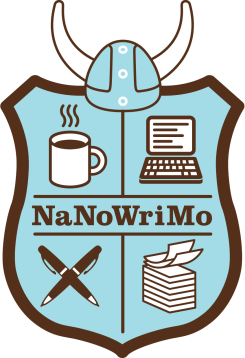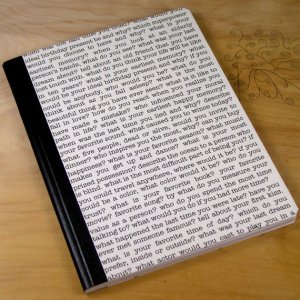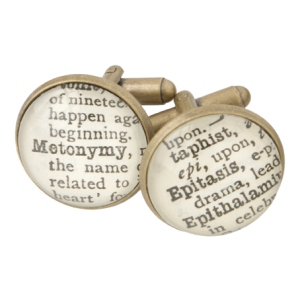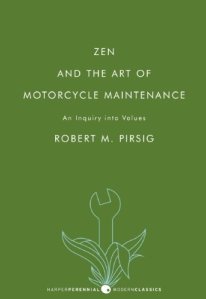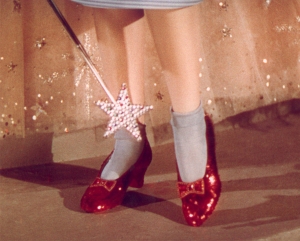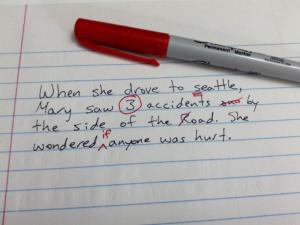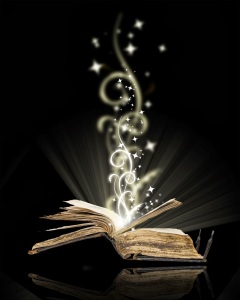 Raise your hand if you remember the #YASaves hashtag frenzy that blazed a trail across the Internet back in the summer of 2011. Anyone? Bueller? Bueller? (as an aside, can you believe it’s already 2014? I still find myself writing “2010” on things!)
Raise your hand if you remember the #YASaves hashtag frenzy that blazed a trail across the Internet back in the summer of 2011. Anyone? Bueller? Bueller? (as an aside, can you believe it’s already 2014? I still find myself writing “2010” on things!)
But I digress, if you don’t remember, that’s OK. Allow me to refresh your memory:
Meghan Cox Gurdon wrote an article on WSJ about the darkness of YA literature, claiming (quite honestly) that much of young adult fiction is “rife with explicit abuse, violence and depravity.”
I say “quite honestly” because she’s right—more and more YA fiction touches on grittier subject matter. But Miss Gurdon’s belief that a penchant to read dark YA fiction “does not merely gratify taste…but creates it” is a bit absurd to me. I don’t believe the darkness is gratuitous or unnecessary or in any way influential of real-life abuse, violence, or depravity.
What we choose to entertain ourselves with, no matter what the media says, is not a direct reflection of the morals and values we hold. Nor do I believe for one minute that seeking out darker subject matter to lose oneself in is an absolute perpetuation of a hunger to do evil, which Miss Gurdon seemed to allude to. Perpetuating that kind of thinking is nothing more than fear-mongering and reduces our society to spineless jellyfish with our morality shaped by musicians, movies, video games, and…wait for it…YA authors.
*Head scratch*
The #YASaves hashtag and social media firestorm that followed Miss Gurdon’s WSJ article was an incredible testament to the power of a reading (and writing) community that banded together in support to show just how amazing YA fiction can be…and not just for adults. Some very notable authors of YA fiction got in on it—Maureen Johnson, Ellen Hopkins, and John Green, bestselling author of The Fault in Our Stars. Even Cheryl Rainfield responded, whose own novel, Scars, was one of the YA books Miss Gurdon used to illustrate her point.
Now Ruth Graham, like Miss Gurdon, has a problem with YA fiction on some level. Graham recently wrote an article on Slate, taking issue with adult readers of YA fiction. She believes that adults should feel ashamed for reading YA novels because they were “written for children.”
I don’t profess to know the minds of the great YA novelists, like John Green and Suzanne Collins, but I am quite sure that as they were click-clacking away at their (probably cleaner than my) keyboards, they weren’t saying to themselves, “Gee willickers, I really hope no adults read this,” while shaking their fists in mock rage at the very idea that anyone over the age of seventeen would dare pick up their books.
In fact, I’m pretty sure it was quite the opposite. I mean as a writer, I know that I personally want to appeal to a broad audience…and no matter what age my characters may be, I want their struggles and their triumphs to be celebrated by anyone that can sympathize or understand them. After all, we write to create. We write to express. We write to connect.
And YA fiction allows us to connect…to our youth, to each other, to ourselves. Because the beauty of YA fiction is that every single adult that reads it was once a child. It’s not like we’re reading something we know nothing about—we experienced the trials and tribulations of young adulthood, some of us with more trials and tribulations than we’d care to admit.
And as a thirty-something adult, my life is already too grown up for my liking. Honestly, don’t we spend the better part of our adult lives looking back, wishing we could redo certain things? We want to recapture our youth. And as youths, we are looking to understand our paths, to get a sense of direction, to not feel so damn alone. Because adolescence can be a lonely, scary place.
YA fiction has bridged gaps that no other genre has done before. It is an ageless, genderless, factionless genre—an all-encompassing genre. As a writer of YA fiction, my love for it lies with the limitless possibilities of subject matter. There is no pretentiousness about YA literary fiction versus YA paranormal fiction versus YA science fiction versus YA romance. YA fiction does not discriminate. It loves. It nurtures. It inspires.
And why would we want to close ourselves to that because our birth certificate has a particular set of digits? Isn’t anything that gets us reading beautiful and amazing? Shouldn’t we nurture literacy without discrimination? What are we showing our youths if we tell them that reading matter is segregated by age?
And while I’m at it, I’m the mother of two teenagers. YA fiction has not only given us common ground to build on, it has also fostered an environment for conversation and discussions about the things they’re witnessing or dealing with: bullying, unhealthy relationships, violence, drugs, discrimination, sex. It helps to remind me that their struggles are just as real as mine.
YA fiction does many things, none of it shameful in my opinion. It gives us—adults AND children—a reason to read, to be creative, to see things in a new light. It breeds compassion and empathy. It inspires thought processes that are not rigid. And it offers possibilities and hope and a sense of fellowship with one another.
The truth is it’s hard to pigeonhole any person’s reason for what they read. And anyone who shames another person for their creative choices should be ashamed themselves.
Read what you love. Write what you love. And everyone else can, in the great words of the Violent Femmes, kiss off into the air.
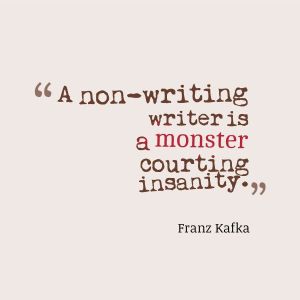 WRITE MORE: You often wonder what the secret is, don’t you? You sit there, aching to figure out what it is that everyone else who has ever typed The End knows that you do not know. It’s obvious to you, there is something you’re missing ,something you’re not doing, that would make you a real writer. You want to know the secret? There isn’t one. They just write. Because a non-writing writer is a monster courting insanity. You are a writer because you write. You write because you’re a writer. So the only way to maintain writer status, the only way to have written is to write. And write some more. That’s the secret. The magic formula. The Pièce de résistance. Just write. And write. And write some more.
WRITE MORE: You often wonder what the secret is, don’t you? You sit there, aching to figure out what it is that everyone else who has ever typed The End knows that you do not know. It’s obvious to you, there is something you’re missing ,something you’re not doing, that would make you a real writer. You want to know the secret? There isn’t one. They just write. Because a non-writing writer is a monster courting insanity. You are a writer because you write. You write because you’re a writer. So the only way to maintain writer status, the only way to have written is to write. And write some more. That’s the secret. The magic formula. The Pièce de résistance. Just write. And write. And write some more.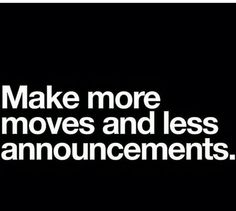 SAY LESS: While you’re writing more in the coming year, remember to say less. Got it? Less talking, more doing. That means Stop telling Twitter and Facebook you’re going to write today. Stop texting your BFF that you need to write later. No more announcements. Just write. Just do it. That’s all. Walk the walk after you talk all the talk.
SAY LESS: While you’re writing more in the coming year, remember to say less. Got it? Less talking, more doing. That means Stop telling Twitter and Facebook you’re going to write today. Stop texting your BFF that you need to write later. No more announcements. Just write. Just do it. That’s all. Walk the walk after you talk all the talk.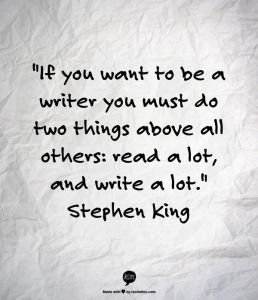 READ MORE: If you want to be a writer you must do two things above all else: read a lot and write a lot.” Stephen king Good writers will read, study the language, and know how to tell their story in a way that reaches their audience. Because the only way to be a good writer is to be a good reader.
READ MORE: If you want to be a writer you must do two things above all else: read a lot and write a lot.” Stephen king Good writers will read, study the language, and know how to tell their story in a way that reaches their audience. Because the only way to be a good writer is to be a good reader.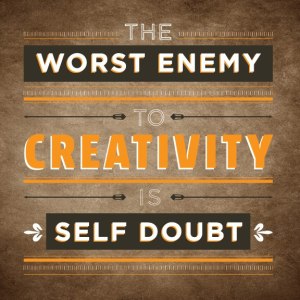 LET GO: You know how I talked about the secret you think every writer knows but you? That’s part of your self-doubt that creeps in. It paralyzes you. Makes you procrastinate. Makes you hate your work. Makes you feel blocked. Self-doubt is the enemy to creativity. Let go of that doubt. Just write. Write crap. Write pure and utter crap. And then write more. And read. And then write some more. Until you aren’t writing crap anymore. Until you’ve found your voice. Just let go of that self-doubt.
LET GO: You know how I talked about the secret you think every writer knows but you? That’s part of your self-doubt that creeps in. It paralyzes you. Makes you procrastinate. Makes you hate your work. Makes you feel blocked. Self-doubt is the enemy to creativity. Let go of that doubt. Just write. Write crap. Write pure and utter crap. And then write more. And read. And then write some more. Until you aren’t writing crap anymore. Until you’ve found your voice. Just let go of that self-doubt.

